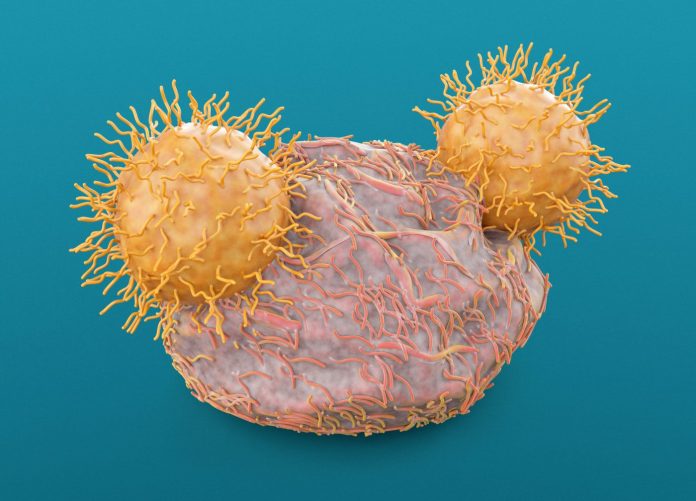
Researchers at City of Hope report the first-ever chimeric antigen receptor (CAR) T-cell treatment of recurrent brain tumors delivered directly to the tumor, bypassing the protective blood-brain barrier. The study marks the completion of the largest Phase I clinical trial to date for any solid tumor type.
“We’re going after one of the most difficult to treat solid tumors,” said Christine Brown, PhD, first author of the current study, which appears in Nature Medicine. “Our local delivery helped us give the most potent therapy,” said Brown, who is The Heritage Provider Network Professor in Immunotherapy and deputy director of the T Cell Therapeutics Research Laboratories at City of Hope Beckman Research Institute and Medical Center in Duarte, California.
Brown described the study as foundational for the treatment of brain cancer with CAR-T cell therapies. “We learned how to deliver these cells, we learned about CAR-T cell manufacturing, and we learned the features of each patient that determined how well the treatment worked,” she said. (City of Hope has its own GMP manufacturing facility.)
The current study evaluated CAR-T cells engineered to target the tumor-associated antigen interleukin-13 receptor alpha 2 (IL13Rα2). At the end of the six-year study, 29 of the 58 patients with recurrent high-grade glioma brain tumors, mostly glioblastoma, achieved stable disease after treatment with CAR-T cells for at least two months. There were two partial responses, one complete response and a second complete response after additional CAR-T cell therapy cycles were delivered under compassionate use.
Doses of the therapy were escalated as the trial progressed and all doses tested were well-tolerated. Researchers evaluated three methods of delivery: at the tumor site alone, at a brain ventricle alone, and at both sites. The median overall survival for all patients was eight months. The trial culminated in treating a patient cohort that used an optimized manufacturing process and injected CAR T cells at both delivery sites. For this final patient cohort, researchers were able to establish a maximal feasible dose and found that these patients had the best median overall survival of 10.2 months, which was higher than the expected survival rate of six months in patients with recurrent glioblastoma.
“These were heavily pretreated patients so we were not sure how they would do with CAR-T cell therapy,” said Behnam Badie, MD, the Heritage Provider Network Professor in Gene Therapy, chief of neurosurgery at City of Hope and the study’s senior author. “But some of them even did better than how they initially responded to standard of care treatments.”
Badie, a clinician, credited the collaboration with Brown, who developed the CAR-T cell therapy, for the current results. “We knew from our animal models that local delivery could be ten times more effective than delivering the therapy systemically,” he said. Badie also said having a GMP facility readily available allowed for readily optimizing the CAR-T cell therapy.
Delivery of the therapy evolved over time, Badie explained. The team learned initially that the treatment delayed local recurrence, but saw that tumors developed in other parts of the brain. “The more you treat the tumors, the more they become aggressive and become multifocal,” he said. Implanting the CAR-T cell therapy at the two sites kept this from happening in some of the patients who remained stable.
In addition to optimizing the delivery method, the researchers determined what tumor characteristics impacted response to treatment. They found the best response rate was among those in which larger numbers of host CD4+ T-cells were present in tumor cavity and cerebrospinal fluid. “This suggests to us that there is important interaction between CAR-T cell therapy and the host immune system,” Brown said. Future changes to CAR-T cell therapies could be designed to further optimize the treatment, Badie added. “We could deliver agents into the tumor microenvironment to engage the immune system in fighting this difficult to treat tumor,” he said.
NOTE: Brown and Badie have financial interests in Mustang. Brown has previously been a paid consultant for Mustang.













